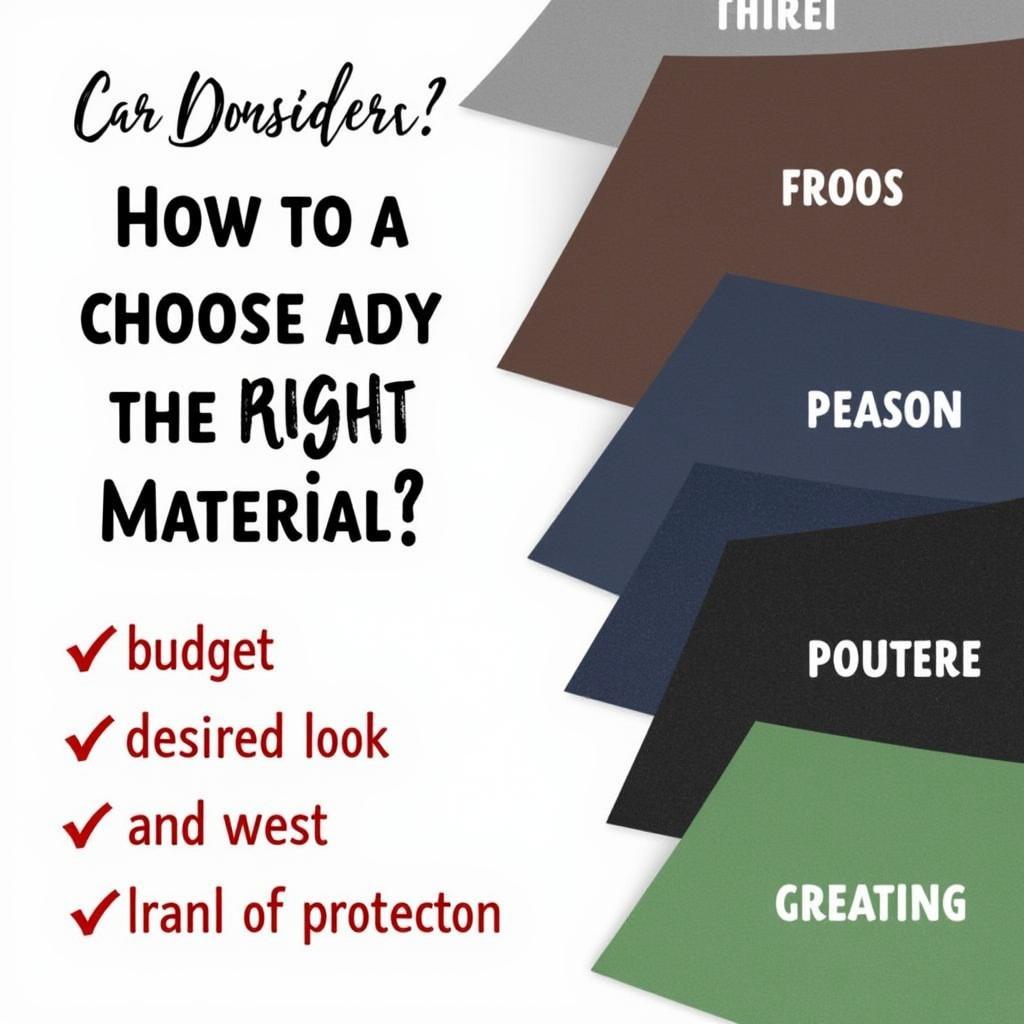Car wrap material has revolutionized vehicle customization, offering a versatile and affordable way to transform your car’s appearance. From vibrant colors and intricate designs to protective layers and unique finishes, understanding car wrap material is crucial for anyone looking to personalize their ride. This guide delves into the world of car wrap materials, exploring their types, benefits, installation process, and maintenance.
Types of Car Wrap Material
Choosing the right car wrap material depends on your budget, desired look, and how long you want the wrap to last. Let’s explore the most popular types:
-
Vinyl: This is the most common car wrap material due to its affordability, versatility, and ease of installation. Vinyl wraps come in a vast array of colors, finishes (gloss, matte, satin, chrome), and textures. They can be printed with custom graphics and designs, offering endless customization possibilities. Within vinyl, you’ll find cast vinyl, a premium option offering superior conformability and durability, ideal for complex curves and recesses. Calendered vinyl is a more budget-friendly option, best suited for simpler designs and shorter-term applications.
-
Polyurethane: Known for its exceptional durability and resistance to scratches, chemicals, and UV rays, polyurethane film is a top choice for protecting your car’s paint. While typically clear or slightly tinted, it can also be used as a base for colored vinyl wraps, adding an extra layer of protection.
-
Paint Protection Film (PPF): A specialized type of polyurethane film, PPF is specifically designed to shield your car’s paint from rock chips, scratches, and environmental damage. It’s virtually invisible and offers excellent protection without altering the vehicle’s original color.
After deciding on your car wraps vinyl, it’s time to choose the right shop. You can search for car wraps near me to find a reputable installer in your area.
Benefits of Using Car Wraps
Car wraps offer numerous advantages beyond aesthetics:
- Protection: Shields your original paint from scratches, UV rays, and minor road debris.
- Customization: Transform your car’s appearance with a wide range of colors, finishes, and designs.
- Resale Value: Protecting the original paint helps maintain the car’s resale value.
- Cost-Effective: Compared to a new paint job, car wraps offer a more affordable way to change your car’s look.
- Removable: Car wraps can be removed without damaging the original paint, allowing you to revert to the factory color or apply a new wrap.
Car Wrap Installation and Maintenance
Professional installation is crucial for a seamless and long-lasting car wrap. The process involves meticulous surface preparation, precise cutting and application, and careful heat shrinking to conform the film to the car’s contours. Proper maintenance is essential to extend the life of your car wrap. Regular washing with a pH-neutral soap, avoiding harsh chemicals, and storing the car in a shaded area when possible will help preserve the wrap’s vibrant color and finish.
Remember, preparing your car’s surface is as important as choosing the right material. A thorough clay bar on a car treatment can remove contaminants and ensure a smooth surface for the wrap to adhere to.
Choosing the Right Car Wrap Material for You
Consider your priorities when selecting a car wrap material. Do you prioritize vibrant color and intricate design, or long-lasting protection and durability? Your budget and the intended lifespan of the wrap will also influence your decision. Consulting with a professional installer can help you choose the material that best suits your needs and desired outcome. Perhaps you are interested in creating a truly unique vehicle. Consider exploring options for custom car badges to complement your new wrap.
 Choosing the Right Car Wrap Material Based on Priorities and Budget
Choosing the Right Car Wrap Material Based on Priorities and Budget
Conclusion
Car wrap material provides a transformative solution for vehicle customization and protection. From vibrant vinyl wraps to durable polyurethane films, there’s a car wrap material to suit every need and budget. Understanding the different types of materials, their benefits, and proper installation and maintenance is essential for achieving the desired results and maximizing the lifespan of your car wrap. By carefully considering these factors, you can confidently transform your vehicle and enjoy a personalized ride that reflects your unique style.
FAQs
-
How long does a car wrap typically last?
A car wrap can last anywhere from 3 to 7 years, depending on the material, installation quality, and environmental factors. -
Can I wash my car with a car wrap?
Yes, you can wash your car with a car wrap, using a pH-neutral soap and avoiding abrasive cleaners. -
Can a car wrap be removed?
Yes, a car wrap can be removed professionally without damaging the underlying paint. -
How much does a car wrap cost?
The cost of a car wrap varies depending on the size of the vehicle, the material chosen, and the complexity of the design. -
Can I wrap my car myself?
While possible, professional installation is recommended for optimal results and to avoid damaging the wrap or the car’s paint. -
What are the different finishes available for car wraps?
Car wraps come in various finishes, including gloss, matte, satin, chrome, and even textured finishes. -
How do I choose a reputable car wrap installer?
Look for installers with experience, positive reviews, and a portfolio of previous work.
Looking for a career change? Check out our career services page for exciting opportunities.
For any assistance, please contact us via WhatsApp: +1(641)206-8880, Email: [email protected] or visit us at 276 Reock St, City of Orange, NJ 07050, United States. We have a 24/7 customer support team.


